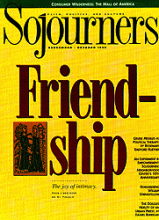I have been told that job changes and moves are the most stress-inducing activities most Americans regularly experience. My family's recent move from Washington, D.C., to Minneapolis would seem to verify one aspect of this claim.
Striking out from friends, family, community, and a familiar neighborhood, the unknown world of the Twin Cities loomed forebodingly. Recognizable grocery chains, bookstore outlets, and thrift stores gave way to unfamiliar names and arrangements.
My then-3-year-old daughter, not one who reacts well to change, was quite concerned about the move. She was being asked to leave a familiar pre-school setting, close friends, and her dad's workplace (where she received consistently wonderful attention).
In the end, she was persuaded by the discovery that her favorite restaurant in Washington, Pizza Hut, would be just a few blocks from her new home. Same personal pan pizzas, same salad bar, same Tuesday night kids' specials, same movie promotions. Once the car hit the parking lot in Minneapolis, alight in a reddish glow from its well-known marquee, she acted as though she was re-entering the womb. She was in a familiar place.
Her experience, though somewhat crude, is not unique. For most Americans, the greatest sense of security comes from a familiarity bred through consumption. When vacationing, many people search for the Golden Arches rather than opting for the local cuisine, and head for the malls for the same merchandise they find in their own area. Why? To feel more "at home." In consumption, community is established.
Read the Full Article

